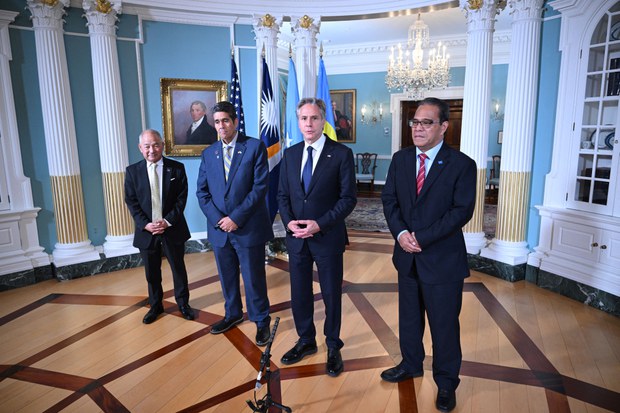Palau, Micronesia and the Marshall Islands, which occupy a militarily strategic expanse of the western Pacific, have warned that delays to U.S financial assistance have created opportunities for “competitive political actors” in the region.
Micronesian President Wesley Simina on Thursday released a letter the three countries had sent to Senate leaders, President Joe Biden and other U.S officials after funding for the island nations wasn’t included as expected in a budget bill sent to the Senate this month.
“Although we understand the delay in the legislation’s approval, it has generated uncertainty among our peoples,” the letter said. “As much as they identify with and appreciate the United States, which formerly governed our islands, this has resulted in undesirable opportunities for economic exploitation by competitive political actors active in the Pacific.”
The Marshall Islands, Federated States of Micronesia and Palau, under agreements known as compacts of free association, give the U.S military access to their vast ocean territories in exchange for funding and the right for their citizens to live and work in the U.S. The agreements also allow the U.S to deny other countries access to the waters.
Amid increased U.S-China rivalry in the Pacific, the three island nations last year signed new economic assistance agreements with the U.S that were significantly more generous. Budget battles between Democrats and Republicans have delayed implementation despite bipartisan support for the compacts.
The supplemental budget bill sent to the Senate earlier this month faces many obstacles, with or without compact funding as part of it, due to partisan differences over other funding plans.
The letter didn’t name China but its inroads with Pacific island nations, including a security pact with the Solomon Islands in 2022, have recently galvanised renewed U.S attention on the region.
China’s government has courted Pacific island nations as it seeks to isolate Taiwan diplomatically and gain allies in international institutions. Beijing regards Taiwan, a democracy and globally important tech manufacturing center, as a renegade province that must be reunited with the mainland.
Last month Nauru, a Pacific island nation of 10,000 people, severed longstanding ties with Taiwan and recognised Beijing. The Solomon Islands and Kiribati switched their diplomatic recognition to Beijing from Taiwan in 2019. The Pacific island nations of Palau, the Marshall Islands and Tuvalu represent a quarter of Taiwan’s remaining diplomatic allies.
The letter dated 06 February from Simina, Palau President Surangel Whipps Jr. and Marshall Islands President Hilda Heine highlights the military importance for the United States of the countries’ combined ocean territories.
“Our free associations effectively expand the United States for defense purposes to cover an expanse of the Pacific larger than the 48 contiguous United States, stretching from west of Hawaii to the Philippines and Indonesia,” the letter said.
“Our partnerships also enable the U.S to base missiles and its earliest warning radars trained on Asia in Palau and a facility that the U.S Joint Chiefs of Staff says is the world’s premier range for ICBM testing and military space operations in the Marshall Islands. They also make it possible for the U.S to conduct military exercises in the Federated States of Micronesia,” the presidents of the three Pacific-island countries added in their letter.
The U.S military is building an over-the-horizon radar station in Palau while the Marshall Islands hosts a U.S ballistic missile testing and space surveillance range on Kwajalein Atoll.
The letter from the island leaders says they “cannot overstate the importance to all our nations of final approval by the U.S Congress” of legislation for the renewed compacts.
U.S analysts have recently warned that failure to secure compact funding would be an enormous blunder for Washington and an opportunity for China to undermine American military dominance in the Pacific.
Micronesia’s previous president, David Panuelo, last year warned of aggressive efforts by China’s diplomats to gain influence in the country, alleging use of bribes and other tactics that he characterized as “political warfare.”
SOURCE:BENAR NEWS/PACNEWS














